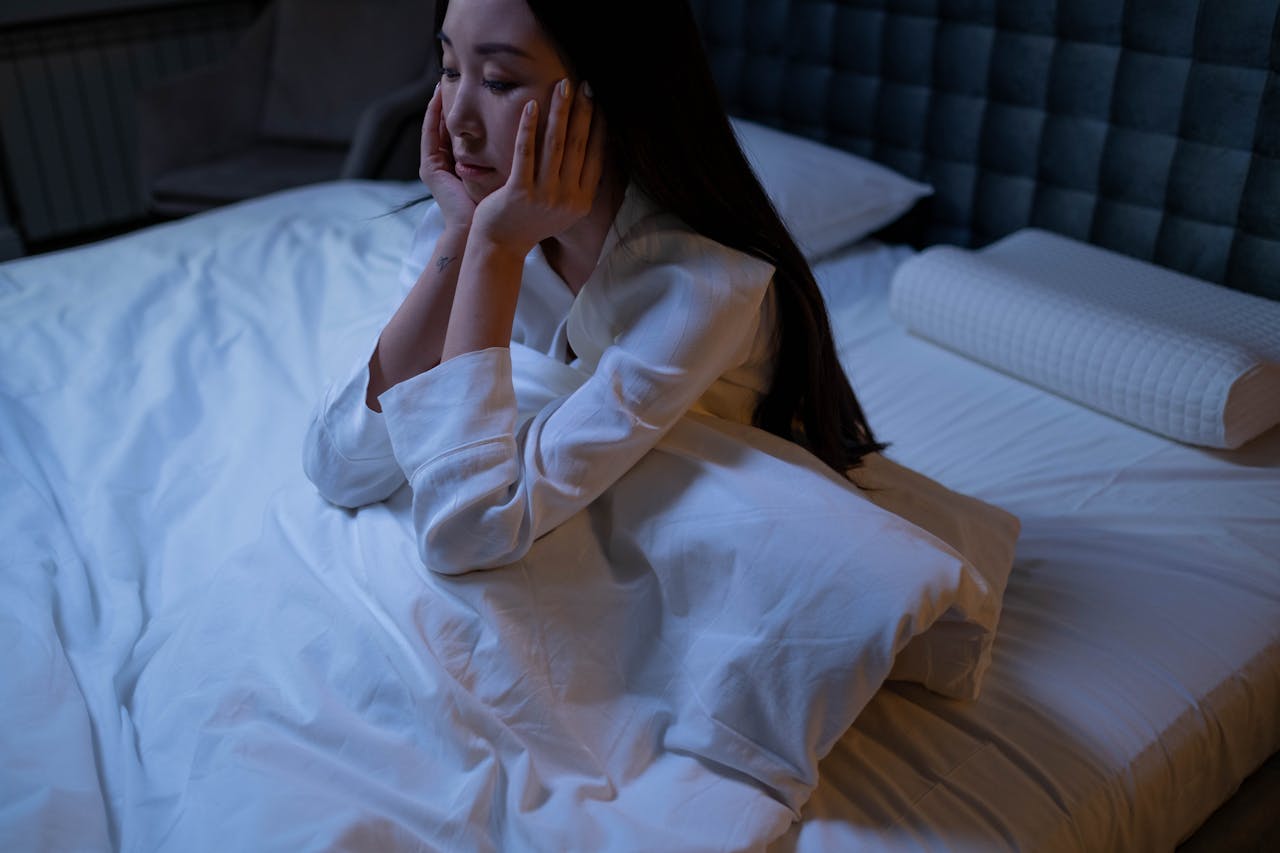
Stress and sleep often have a complicated relationship.
While stress can make it hard to fall or stay asleep, lack of rest can, in turn, amplify stress levels, creating a challenging cycle. For many, this vicious loop leads to chronic insomnia, leaving them searching for effective insomnia solutions.
If you find yourself tossing and turning at night, plagued by racing thoughts, you’re not alone.
This guide will explore the connection between stress and sleep, practical insomnia solutions to regain control over your rest, and ways to build healthier sleep habits to break the cycle once and for all.
How Stress Affects Sleep
Stress triggers the body’s fight-or-flight response, releasing cortisol and other stress hormones.
While these hormones are vital in emergencies, chronic stress can keep your body in a heightened state of alertness, making it difficult to relax and fall asleep.
Common signs of stress-induced sleep problems include:
- Difficulty falling asleep despite feeling tired
- Waking up frequently during the night
- Feeling restless or tense even in bed
- Experiencing vivid, stressful dreams
Over time, poor sleep can make you feel irritable, foggy, and less equipped to handle daily challenges, creating a feedback loop where stress and sleeplessness reinforce one another. This is where targeted insomnia solutions become essential.
Practical Insomnia Solutions to Break the Cycle
Breaking the cycle of stress and insomnia requires addressing both the underlying stress and your sleep habits.
Below are proven strategies to help you take control of your nights and improve your rest.
1. Create a Relaxing Bedtime Routine
A consistent, calming routine signals to your body that it’s time to wind down. Consider these steps:
- Dim the lights an hour before bed to stimulate melatonin production.
- Engage in relaxing activities, like reading a book, meditating, or taking a warm bath.
- Avoid stimulating activities, such as checking emails or scrolling on your phone.
2. Limit Screen Time Before Bed
Blue light emitted by screens can suppress melatonin and disrupt your sleep-wake cycle. Limit screen time for at least an hour before bedtime and consider using blue-light-blocking glasses or screen filters.
3. Practice Stress-Reduction Techniques
Managing stress is a crucial part of insomnia solutions. Techniques like deep breathing, progressive muscle relaxation, or mindfulness meditation can help calm your mind and body. Even dedicating five minutes a day to these practices can make a difference.
4. Stick to a Sleep Schedule
Your body thrives on consistency. Go to bed and wake up at the same time every day, even on weekends. This helps regulate your internal clock and improve sleep quality over time.
5. Create a Sleep-Friendly Environment
Optimize your bedroom for better sleep by:
- Keeping the room cool, quiet, and dark
- Investing in a comfortable mattress and pillows
- Using blackout curtains or a white noise machine if needed
6. Watch What You Eat and Drink
Avoid caffeine, alcohol, and heavy meals close to bedtime. Instead, opt for sleep-promoting snacks like bananas, almonds, or a small glass of warm milk.
7. Exercise Regularly
Regular physical activity can help reduce stress and improve sleep quality. Aim for at least 30 minutes of moderate exercise most days of the week, but avoid vigorous workouts close to bedtime.
Cognitive Behavioral Therapy for Insomnia (CBT-I)
If self-help strategies aren’t enough, Cognitive Behavioral Therapy for Insomnia (CBT-I) is a highly effective treatment.
CBT-I works by identifying and changing thoughts and behaviors that negatively affect your sleep.
A trained therapist can guide you through this structured approach, offering personalized insomnia solutions tailored to your needs.
Why Insomnia Solutions Work Best When Combined
Addressing insomnia often requires a multifaceted approach.
Combining stress management techniques, good sleep hygiene, and professional treatments like CBT-I creates a holistic strategy to overcome insomnia and restore restful nights.
FAQs About Insomnia Solutions
What is the best way to cure insomnia?
The best approach depends on the cause of your insomnia. For stress-related insomnia, combining stress-reduction techniques, proper sleep hygiene, and therapies like CBT-I offers the most effective results.
Will my insomnia ever go away?
Yes, with the right insomnia solutions, most people can significantly improve their sleep. Identifying and addressing underlying causes is key to breaking the cycle and restoring consistent rest.
How to overcome lack of sleep?
Start by improving your sleep environment and establishing a consistent routine. Pair these steps with stress-reduction practices and consider seeking professional help if your insomnia persists.
Why does my insomnia keep coming back?
Recurring insomnia often indicates unresolved stress, poor sleep habits, or underlying health issues. Identifying triggers and implementing long-term insomnia solutions can help prevent future episodes.
Moving Forward
Stress and insomnia can feel overwhelming, but with the right strategies, you can break the cycle and reclaim your nights.
From establishing a calming bedtime routine to seeking professional help, every step you take brings you closer to better rest.
Remember, sleep is essential for your overall well-being.
By prioritizing your mental and physical health, you’re setting the foundation for more restful nights and stress-free days.
Feel Heard, Feel Safe, Feel Better - Contact Us

In-Person Sessions
2100 Manchester Rd. Suite 501-1
Wheaton, IL. 60187
Virtual Sessions
Throughout Illinois
